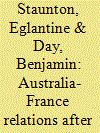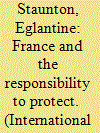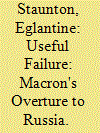| Srl | Item |
| 1 |
ID:
191824


|
|
|
|
|
| Summary/Abstract |
The centrepiece of the AUKUS defence pact agreed between Australia, the United Kingdom, and the United States in September 2021 was a commitment to help Australia acquire nuclear-powered submarines. This made redundant an earlier $90 billion deal Australia had entered into with France to deliver conventionally powered submarines. Australia’s decision to renege on the French deal, as well as the revelation that three of France’s key partners had negotiated AUKUS in secret, triggered a furious French diplomatic response. In this commentary, we explore the ramifications of this episode for future Australia-France relations. We begin by documenting the immediate diplomatic fallout of the AUKUS announcement and tracing how the dispute became personalised between Australian Prime Minister Scott Morrison and French President Emmanuel Macron. We then move to consider how the episode reveals the divergent approaches Australia and France are taking in response to China’s growing influence in the Indo-Pacific. Finally, we highlight three reasons why this episode represents a theoretically valuable case study for scholars interested in the roles of trust and leadership in global politics, given it features the breakdown of interpersonal trust between leaders of friendly states.
|
|
|
|
|
|
|
|
|
|
|
|
|
|
|
|
| 2 |
ID:
161655


|
|
|
|
|
| Summary/Abstract |
Although France has been a key actor of human protection since the 1980s, the existing literature often adopts an Anglo-Saxon focus or concentrates on states which have been reluctant to see international norms of human protection develop. As a consequence, it overlooks France’s central role in the development of the Responsibility to Protect (R2P), which can be seen as the leading norm of human protection today. In turn, the growing influence R2P has had on France’s conception and practice of human protection – and on its foreign policy more generally – remains unexplored. This article is the first of its kind to correct these oversights by examining France’s relationship to R2P from its emergence till date. It argues that to do so, we need to analyse the evolving relationship of two interconnected – yet distinct – norms: France’s domestic norm of human protection on the one hand, and the international norm of R2P on the other. It builds on the constructivist literature to offer a theoretical framework that allows the study of this tale of two norms and draws upon elite interviews of key actors such as Gareth Evans and Bernard Kouchner to provide a unique understanding of France’s relationship to R2P. Through this tale of two norms, the article reshapes our understanding of both R2P and France’s past and current foreign policy. In addition, it contributes to the literature on norm diffusion, in particular by deepening our understanding of how domestic and international norms interplay.
|
|
|
|
|
|
|
|
|
|
|
|
|
|
|
|
| 3 |
ID:
183783


|
|
|
|
|
| Summary/Abstract |
Throughout his presidency, French President Emmanuel Macron has promoted a rapprochement between the European Union and Russia. He conceived it as a means to two ends: the strengthening of the EU and the protection of what he has referred to as ‘European civilisation’. Russia’s invasion of Ukraine has shown that Macron’s gamble has failed. As a result, some adjustments to Macron’s foreign policy with respect to Russia are necessary and under way. Other aspects of his European policy, however, remain sensible and more relevant than ever.
|
|
|
|
|
|
|
|
|
|
|
|
|
|
|
|